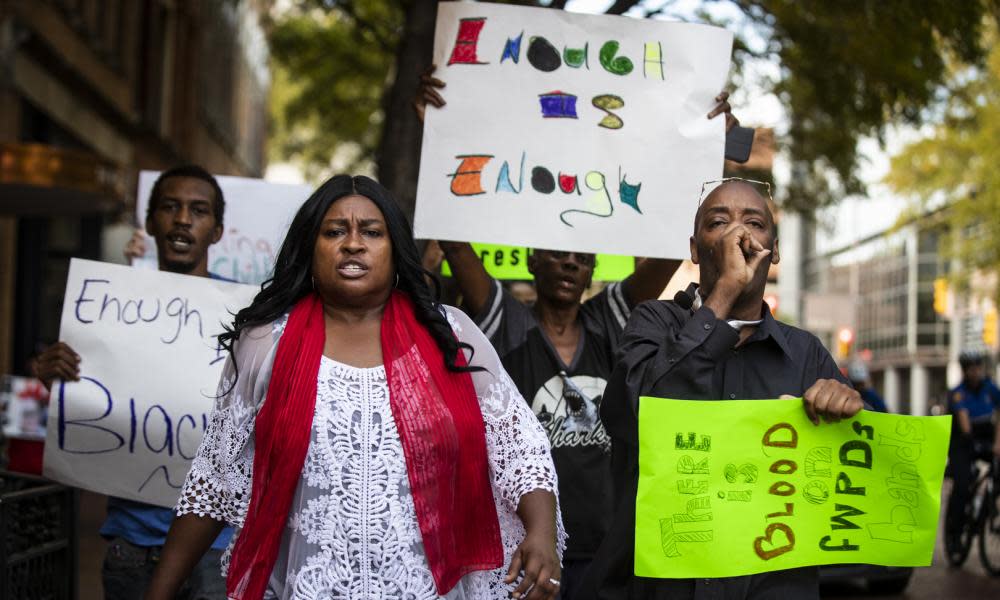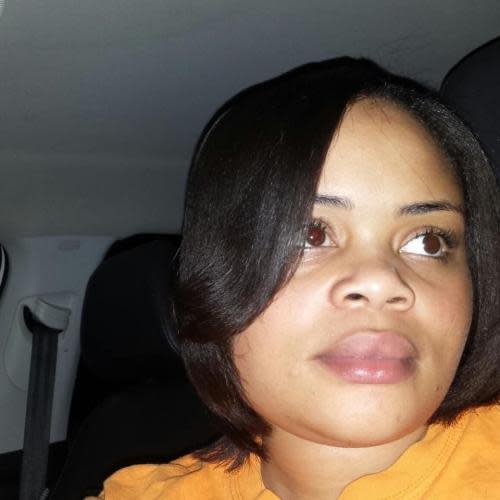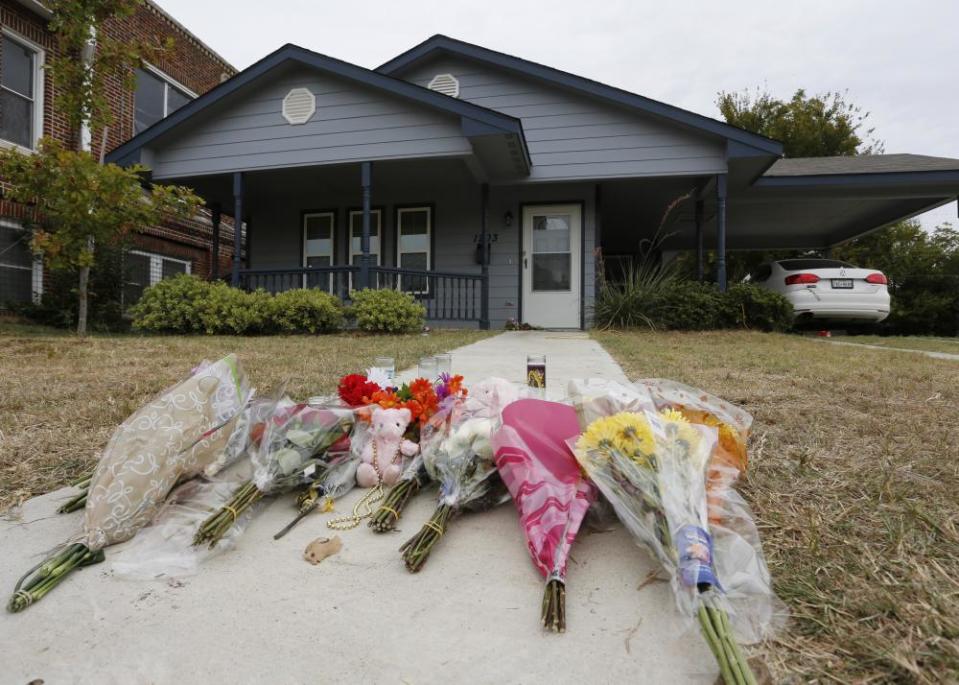'We will fight back': how the police killing of a black woman in Texas sparked fear and anger

Adarius Carr watched the video of his sister’s killing and struggled to understand.
A police bodycam recorded the Fort Worth officer Aaron Dean in the dead of night pulling open the gate to Atatiana Jefferson’s back garden. He had a torch in one hand and a gun in the other. The policeman looked around suddenly wheeled about to shine the light on a window and shout: “Put your hands up! Show me your hands!”
Before he finished speaking, Dean fired a single shot.
On the other side of the window, Jefferson, a 28-year-old African American woman who had been playing video games with her young nephew, collapsed and died.
“None of it makes sense to me,” said her brother, a US navy sailor.
Within 48 hours, Dean was arrested on a murder charge. Carr described that as a start but said Dean did not bear responsibility alone for yet another killing of an African American in their own home by a white police officer.
“He really cannot be a scapegoat for what’s happened,” said Carr. “Yes, he’s going to take his punishment but the system failed him. Whoever more senior was with him failed him. Whoever sent him out failed him. The training failed him.”

Jefferson’s death has rocked a Texas city already attempting to shore up public confidence in a force responsible for killing seven people in recent months.
Angry Fort Worth residents also drew parallels with a police shooting in Dallas – the killing of an unarmed black man, Botham Jean, in his own apartment by Amber Guyger, an officer who was convicted of murder earlier this month.
People paying respects amid flowers laid outside Jefferson’s house struggled to understand how officers responding to a neighbour asking for a “welfare check” because he spotted an open door at 2am could have approached it like a crime scene, with guns drawn and failing to announce their presence, and then killed a woman in her own home.
“It’s unbelievable. In years past you would say this is an isolated incident but this is happening way too often by law enforcement,” said Alvin Finkley, an African American forensic chemist who analyses seized drugs for the Dallas county police and lives in Fort Worth.
The killings of Jefferson and Jean followed the murder conviction last year of another white police officer, in Dallas county, for shooting an unarmed 15-year-old African American boy in the back of the head as he sat in the passenger seat of a car that failed to stop.
But if Fort Worth was rocked by the latest shooting, it was also caught off guard by the official response. The Republican mayor of Fort Worth, Betsy Price, swiftly denounced the shooting as unjustified. The city’s police chief, Ed Kraus, responded with an unusual outpouring of emotion as he spoke of the need for his officers to “react with a servant’s heart instead of a warrior’s heart”. Less than 48 hours after the killing, Dean was arrested for murder.
To say it’s only endemic to the Fort Worth police department ignores the reality
State representative Harold Dutton
Few in Texas would have predicted murder charges against police officers would even be laid until recently, let alone their conviction by juries.
The Jefferson family lawyer, Lee Merritt, said that for a brief moment he thought justice might be done.
“As we learned that the officer who was responsible for her murder was arrested and charged, that was a positive moment where it seemed like the judicial system was acting a little differently,” he said. “We don’t see officers led away in handcuffs very often.”
But the atmosphere quickly soured. Dean was released on bail within hours and it was revealed that the police interrogated Jefferson’s eight-year-old nephew alone and then recorded that he said his aunt was pointing a gun at the window when she was shot. Merritt accused the police of laying the ground for Dean to claim self-defence.
Politicians and protesters said the circumstances of the shooting raised questions about the recruitment and training of police officers in Texas and beyond.
“Why is this happening?” said the state representative Harold Dutton, a member of the Texas legislative black caucus. “To say it’s only endemic to the Fort Worth police department ignores the reality of a system that has resulted in the deaths of so many all over this country. Unless we fix the system, we can be assured that we have many more deaths to come.”
The police department has yet to explain how the neighbour’s call to a non-emergency number asking for a patrol to check on Jefferson’s house because of an open door became an “open structure call” by the time Dean and other officers were dispatched. That meant they treated the check as a suspected break-in and took a more confrontational approach.
The officers saw the open front door and looked into the living room. At no point did they announce their presence. Not seeing anyone, Dean went into the back garden and, with his gun drawn, shone a torch in a window.
The police say Jefferson reached for her gun and pointed it at the window. Dean demanded she raise her hands, still without saying he was a police officer, and then a split second later shot her.
Related: Fort Worth police chief: 'absolutely no excuse' for officer killing black woman
The mayor and the police chief have both been careful to say that Jefferson had every right to pick up her gun if she felt threatened, and the failure was Dean’s for not announcing who he was.
The state representative Nicole Collier, chair of the Texas legislature’s criminal jurisprudence committee and vice-chair of the black caucus, said the shooting raised questions about the quality of police training, which often emphasizes an officer’s safety over the welfare of the public.
“Unfortunately, to become a cosmetologist is the same amount of time that it is to become a police officer,” she said. “Basic police officers take 720 hours but to become a cosmetologist is 1,000 hours.”
‘So many families’

Alex Piquero, a professor of criminology at the University of Texas, said that while he “absolutely understands why people are upset”, he has found no evidence that there is a systematic issue with recruitment or a systematic problem of police officers being too quick to open fire in Texas or across the country.
“I don’t see any empirical evidence to demonstrate that recruits into policing are any worse than the recruits to any other profession,” he said. “We have doctors who lose their medical license. We have people in every profession who get fired or make mistakes on those jobs.”
That was not how it was seen as anger poured out at a packed city council meeting the day after Dean’s arrest. Amid chants of “this city is not safe”, one speaker after another accused the council of inaction.
Angela Darden told the council her brother, Jermaine, died of a heart attack as he was shot with a stun gun and held in a chokehold during a drug raid in 2013.
“I’ve been coming here for so many families and I’ve been saying this time and time again: that you people do not give a rat’s ass about this city,” she said.
Kraus, the police chief, stood at the back, listening without expression. One speaker, Ed Austin, turned to him and said: “You can’t come to our communities and terrorize us no more. We will fight back.”
Pressure had been building after a series of killings by the police in recent months, although Kelly Allen Gray, one of only two African American members of the city council, cautioned they were very different from the circumstances of Jefferson’s death.
“We had one shooting where someone took his ex-girlfriend and children hostage and then used a child as a shield as he fired upon police. So I don’t think you can lump all these killings in together,” she said.
Allen Gray acknowledged the public anger but she was concerned that blanket vilification of the force would harm communities that rely on it for protection and hurt progress.
“The police relationship with the community is not as broken and fractured as it once was,” she said.
“Is it ever enough? No. But if I had to look back to when I first came on the council and I look at now, we have made really good strides. There are instances where you really want the police there. You want the police to show up.”

 Yahoo News
Yahoo News 
